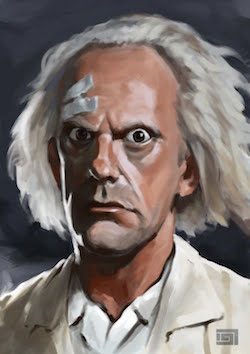Syllabus

Where we're going, we don't need roads. (Brown, 1985)
Objectives:
I've been doing digital archaeology and digital history for over ten years. I still don't know the answer to the questions below, so I look forward to puzzling these out with you over the duration of the course:
- what is digital history?
- how do we do good digital history?
- what is good digital history, anyway?
- how do we write history, digitally?
That is to say, digital history is sometimes about tools and methods, but other times about theory. Sometimes it is about representation and consumption, and other times about production. I'm pretty sure it decentres the professional historian, but sometimes, it puts us firmly back in the driver's seat. I do know that there are no roads; there might not even be maps.
In which case, we are going to explore these issues as they pertain to Public History. In particular, we are going to learn how to communicate these issues via 'playful' technologies. Some of this will be in the context of a public museum and the implications for the practice of Public History.
Final Project Outcome:
The creation of a major mixed media project with associated digital repository, demonstrating an awareness of the ways digital history can be used to bridge professional practice and the public.
Minor outcomes:
A body of public reflections on the process of doing digital history; a reflection on the entire process of doing the final project that expresses a critical evaluation of the evolution of the student’s engagement with digital history.
Digital Identity
An essential part of the life of the scholar […] is your digital identity. How do you present online when people find you through a Google search (as they inevitably will)? What kind of scholar are you? What are your skills? Your interests? Are you an interesting person? Do you take part in debates of consequence? It used to be that outside of our circle of close friends and colleagues, others knew us through our published work. In today’s scholarly ecosystem, we are known by our digital footprint as well as by our “published” work.”
—Mills Kelly
There is a developing ecosystem of digital artefacts that form an increasingly more important part of one’s scholarly persona. You need to think carefully about how you present yourself online, and if you aren’t already doing so, crafting a niche for yourself there. You may wish to obtain a domain name of your own; I would recommend Reclaim Hosting as a place to start. For the purposes of this course, you will be setting up hosting for your course work via a free account with github.com
Now Read On...
Now, make sure you read the sections on crafting, open access workflows, and future proofing your research.
Then, please see the details regarding Assessment | Final Project | Weekly Schedule, Readings, and ProgHist tutorials | Some Digital History Projects in the Wild